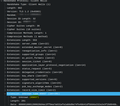
TLS Extensions 65037 during client hello since firefox 118 (Windows)
Hello,
I see with windows Firefox version 118 a TLS extension id 65037 on every client hello handshake containing a bunch of data. Does somebody know what this extension is used for? I couldn't find anything about this on the web or in the firefox docs / release notes. Other browser (chrome / edge) don't have this extension in use.
Thanks
Выбранное решение
That is Encrypted Client Hello (ECH), it will go away if you change security.tls.ech.grease_probability to 0 in about:config. Chrome has it behind a flag.
Прочитайте этот ответ в контексте 👍 2Все ответы (4)
Выбранное решение
That is Encrypted Client Hello (ECH), it will go away if you change security.tls.ech.grease_probability to 0 in about:config. Chrome has it behind a flag.
On Linux firefox 118 doesn't have this extension in use.
It's a limited rollout, you can see them listed in about:support#remote-features.
zeroknight said
That is Encrypted Client Hello (ECH), it will go away if you change security.tls.ech.grease_probability to 0 in about:config. Chrome has it behind a flag.
Thank you for clarification.

